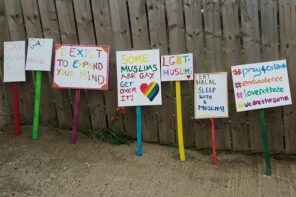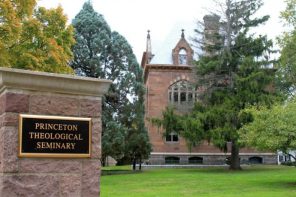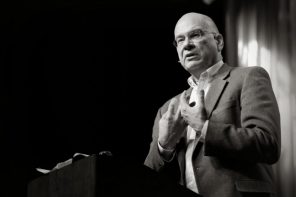One morning five years ago, I was sitting in my tiny cinderblock apartment on my seminary’s campus in the middle of Texas. Across my battered, thrift-store kitchen table sat my friend John, a fellow seminarian and an openly queer Presbyterian.
Nervously, I stirred cream into my coffee, trying to summon the courage to tell him why I’d invited him over. “Okay,” I began, “I think I’m queer.” I watched him take this in, and then I continued, “But I just have these questions and I don’t even want to say them out loud because they’re awful.” Staring a hole into my table, I quietly asked, “What if I think I’m queer but I’m not? What if it really is a choice? What if we’re all wrong and God hates us and we really are going to burn in hell?”
Like so many other bisexual, transgender, lesbian, gay and queer people, those questions kept me too afraid to embrace my sexuality and come out for years. The fear, self-loathing, and internalized homophobia so profoundly ingrained took me right to the edge of depression and self-harm as a young adult. And even now, as a theologically trained clergyperson and an openly bisexual activist, the vestiges of such destructive Christian theology stubbornly echo somewhere deep inside of me.
In the days after the horrific massacre at Pulse Nightclub in Orlando, prayers and statements of sympathy poured out from all over the country and the world. Even some conservative, non-affirming Christian groups offered messages of condolence and love. Most of these groups joined the chorus of those blaming the shooter’s Muslim faith for his homophobic violence, while they were careful to avoid affirming queerness—or even acknowledging it—in their own condolences.
Though these Christian groups sought to carefully distance themselves from any reputation for faith-based anti-LGBT sentiment, others were quick to point out their hypocrisy. In a piece directly responding to Southern Baptist leader Russell Moore, ThinkProgress LGBT Editor Zack Ford explained why conservative Christians’ sympathies toward LGBT people ring hollow in the absence of genuine affirmation. Ford writes, “…as terrified as we might be from the destruction wrought on our brothers and sisters in Orlando, we’re still just as terrified of Moore and those who follow the anti-LGBT beliefs espoused by the SBC and plenty of other Christian denominations.”
Ford openly identifies as an atheist, but the post-Orlando call for Christians to recognize their own complicity in homophobic violence has come from within the church as well. Even Pope Francis acknowledged that the church owes an apology to gay people, though he did so without suggesting any change in the Catholic Church’s stance that homosexuality is a sin.
Rev. Denise Anderson, who was recently elected as one of the co-moderators of my own denomination—the Presbyterian Church USA (PCUSA)—wrote a blog post on the day of the shooting, boldly claiming that the church and the Orlando shooter “have been in the same business.” In response to the horrific death toll in Orlando, Anderson asked, “How many LGBT sisters and brothers have we—the Church—gradually and systemically killed over a longer period of time?”
Unsurprisingly, Rev. Anderson and others who have called out the church’s homophobic history have faced intense backlash from Christians enraged at being compared to a terrorist or accused of responsibility for anti-LGBT violence. However, there is indisputable truth in Anderson’s and others’ words. Traditional Christian theology holds that homosexuality is sinful—a perversion of God’s intention for human relationships. At its worst, this theology has spawned conversion therapies with well-documented devastating long-term effects. But even outside of such extreme measures, Christianity has contributed to a deeply entrenched cultural sense that queer and trans people are inherently wrong, defective, and unworthy of love or acceptance. This ideology—reinforced even now by many Christian churches and leaders—has led to countless hate crimes, alarmingly high numbers of homeless LGBT young people, and staggering rates of depression, self-harm, and suicide among LGBT youth and adults.
Of course, a growing number of churches and denominations today have rejected such a destructive understanding of human sexuality. Religion Dispatches recently compiled a list of the official positions on LGBT issues currently taught by various Christian denominations. According to this list, mainline Protestant denominations such as the United Church of Christ and the Episcopal Church claim that homosexuality is not antithetical to Christian teaching, while PCUSA supports an inclusive understanding of marriage and is “generally LGBT affirming.”
Even denominations such as the Catholic Church and the United Methodist Church—whose official theology still holds “homosexual acts” to be sinful—have majority percentages of their membership who believe homosexuality should be accepted by society. It’s also worth noting that even the Mormon Church—which staunchly condemns homosexuality—still has language that explicitly decries any unkind treatment of those who identify as gay. A number of other denominations whose official stances reject homosexuality still contain a significant proportion of members who believe it should be accepted by society.
“The painful reality of our time is that, to whatever extent we are not vocally affirming that LGBT people are beloved nor explicitly countering claims that queerness is sinful, we are allowing Christian homophobia to persist.”
While the shifts toward LGBT inclusion and justice in many Christian churches and among Christian individuals are encouraging, the dominant narrative still suggests that queerness and Christianity are incompatible. As a lifelong Christian and now a pastor, I know that church can be an environment of love, acceptance, and belonging. As a queer person, I also know what it means to struggle under the fear of damnation and rejection by both God and those I love.
From my vantage point as a faith leader in the largely affirming PCUSA, I recognize a tendency in progressive Christian circles to separate ourselves from “those Christians” whose theologies contribute to homophobia and anti-LGBT violence. However, as long as the prevailing cultural perception of Christianity holds it as non-affirming of LGBT people, all of us who claim Christian faith have some degree of complicity in anti-LGBT culture and the resulting violence, murder, and suicide.
I grew up in a generally moderate congregation and I have no particular memory of ever being told that homosexuality was wrong, either by my parents or my church. I didn’t even receive that kind of clear and direct anti-LGBT messaging at the conservative Southern Baptist camp I attended throughout my childhood. And still, I spent a decade and a half of my life struggling with depression and hopelessness about my sexuality—terrified of my inability to quash it. Even with significant progressive Christian influences, I still learned to fear that my queerness made me sinful and doomed to rejection and then Hell.
As the list referenced above reveals, too often Christian churches choose to be unofficially or quietly welcoming of LGBT people without vocally or officially offering affirming theology and polity. The painful reality of our time is that, to whatever extent we are not vocally affirming that LGBT people are beloved nor explicitly countering claims that queerness is sinful, we are allowing Christian homophobia to persist.
Holocaust survivor and author Elie Wiesel famously said, “We must always take sides. Neutrality helps the oppressor, never the victim. Silence encourages the tormentor, never the tormented.”
While many moderate and progressive Christian churches cling to the middle ground in an attempt to keep everyone happy, queer people are dying—devastatingly convinced that God hates them. We bear some of the weight of responsibility for those deaths, but we don’t have to keep being complicit. We can take a side.
Two days after the Orlando shooting, I asked my boss—the head pastor of the prominent downtown church where I serve—if we could join other churches in tolling our bells the next afternoon in honor of the victims. She brought it up at our staff meeting and, with emphatic input from others, the idea evolved into an ecumenical prayer service with Jewish and Muslim partners, music, and a reading of the victims’ names. We tied hundreds of rainbow-colored ribbons along the railing outside our building in memory of victims of anti-LGBT violence, and we hung a giant rainbow flag over the front doors of our sanctuary, which look out onto Chicago’s famous Magnificent Mile.
My church has a long history of engagement in social justice and has been a welcoming space for LGBT people for years. But as the rainbow flag flapped in the wind above the prayer service, several church members present remarked that such a public statement of solidarity and welcome had never happened before—and wouldn’t have. Something had changed for us at Fourth Presbyterian Church—we realized we needed to own the affirmation we believed in. It’s awful that it took an act of horrific violence to inspire such a shift, but I’m hopeful for what else could follow both in my own congregation and in the church as a whole.
For the rest of Pride month, that flag hung over one the busiest streets in Chicago, outside the second-largest PCUSA church in the country, and offered thousands of people a loud and powerful declaration that queerness and Christianity do not have to be at odds—they can find home in the same place.
A flag is not nearly enough—there is so much work that remains to be done. But it shows a glimpse of what our voice could be if we let it—a voice of justice and solidarity. That is the voice God needs the church to speak loudly and powerfully into this world—louder than gunshots and hateful anti-LGBT rhetoric, as powerful as love that overthrows death.





